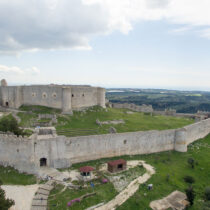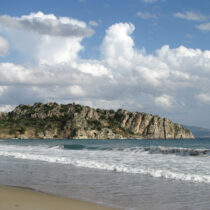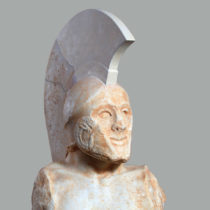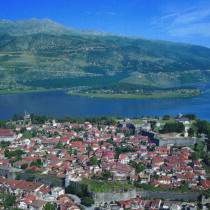Inbred Neanderthals left humans a genetic burden
Non-African human populations today have marginally lower fitness thanks to Neanderthal inheritance.
New support for human evolution in grasslands
Buried deep in seabed sediments off east Africa, scientists have uncovered a 24-million-year record of vegetation trends in the region where humans evolved.
Ice age bison fossils shed light on early human migrations in North America
Study dates the first movements of bison through an ice-free corridor that opened between the ice sheets after the last glacial maximum.
“Pristine” landscapes haven’t existed for thousands of years due to human activity
An exhaustive review of archaeological data from the last 30 years provides details of how the world's landscapes have been shaped by repeated human activity over many thousands of years.
Did dinosaurs have lips?
Can a crocodile’s smile reveal whether dinosaurs had lips? What if lips and gums hid most of dinosaur's teeth?
A national plan to excavate the Judean Desert caves
The Israel Antiquities Authority is promoting a national plan for comprehensive archaeological excavations in the Judean Desert caves, and rescuing the Dead Sea Scrolls.
The thermal baths of Methana
One of the most interesting facts about the district’s bathing facilities is the traditional main building of the Methana thermal baths, designed by the well known architect E. Ziller.
Works from the Louvre are moved due to flood
Works of art kept at underground reserves of the Louvre and the Musee d'Orsay are moved to higher levels due to floods.
Underwater ‘lost city’ found to be geological formation
When underwater divers discovered what looked like paved floors, courtyards and colonnades, they thought they had found the ruins of a long-forgotten civilization that perished when tidal waves hit the shores of the Greek holiday island Zakynthos...
Dogs were domesticated not once, but twice…
New research shows that man's best friend may have emerged independently from two separate (possibly now extinct) wolf populations that lived on opposite sides of the Eurasian continent.
How southeastern Mayan people overcame the catastrophic eruption of Ilpango?
Researchers discovered a Great Platform built with different kinds of stone at the archeological site of San Andrés, El Salvador, and challenged the prevailing theory regarding the sociocultural development of Southeastern Maya frontier.
King Tut’s dagger was made of meteorite iron
A new study shows that a dagger from King Tutankhamun's tomb was made from meteorite material.
Archaeological research into Britain’s oldest hand-written documents released
Archaeologists from MOLA have published research into Britain’s largest, earliest and most significant collection of Roman waxed writing tablets.
Ancient Wari Empire likely did not cause large shifts in population genetic diversity
Wari imperialism probably exerted through cultural diffusion, not population replacement.
French cave sheds new light on the Neanderthals
Deep inside Bruniquel Cave, in the Tarn et Garonne region of southwestern France, a set of man-made structures 336 meters from the entrance was recently dated as being approximately 176,500 years old.
Iron Age skeletal remains gifted to Isle of Wight Museum
The prehistoric remains of a woman discovered about a year ago on the Isle of Wight have been gifted to the Isle of Wight Museum.
What were Aegean texts for?
The lecture by John Bennett will take place at the British School at Athens, as part of the Annual Meeting of Aegeus.
The high-tech 3D mapping of Homo naledi’s Dinaledi chamber
In 2013, after the discovery of the hominin assemblage, Berger put a call out for "skinny" explorers to join him on the expedition to excavate what became known as the Dinaledi Chamber...
New Cretaceous fossils shed light on the early evolution of ants
Recent studies suggest that the early branching lineages of extant ants formed small colonies of either subterranean or epigeic, solitary specialist predators.
An experiment might explain the transport of Stonehenge blocks
An experiment by University College London tried to provide an answer to the question of how Stonehenge was built.
Significant discovery of cave paintings in northern Spain
Archaeologists in Spain have discovered a series of Palaeolithic era cave paintings in northern Spain, among the best found so far in the country.
‘Greeks’ exhibition to οpen June 1 at National Geographic Museum in Washington, D.C.
The Greeks makes its final of two US stops, and its only East Coast appearance, at the National Geographic Museum, where it opens to the public on June 1.
Pyramid of Unas reopens to public
After two decades of conservation and renovation works, the Pyramid of Unas was opened again to the public last Friday.
Remains of rice and mung beans help solve a Madagascan mystery
The first archaeological evidence that settlers from South Asia are likely to have colonised the island over a thousand years ago.




























